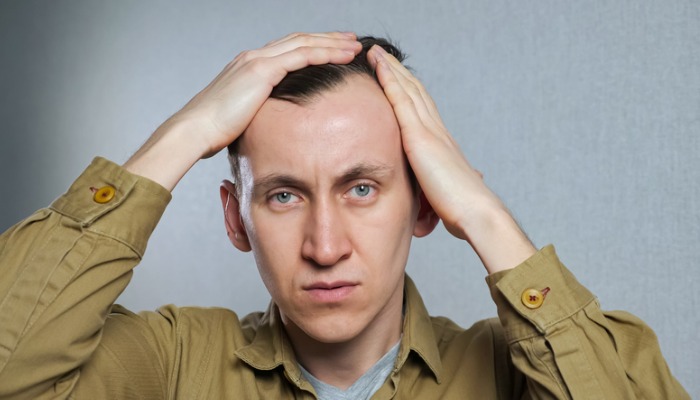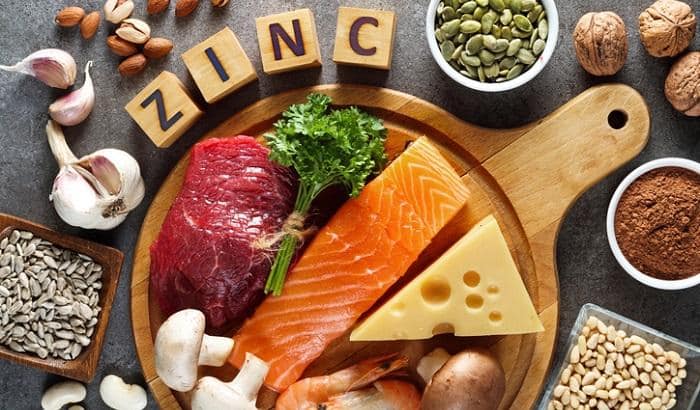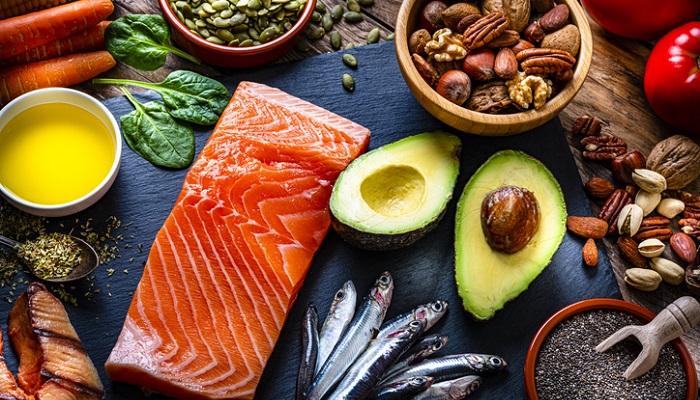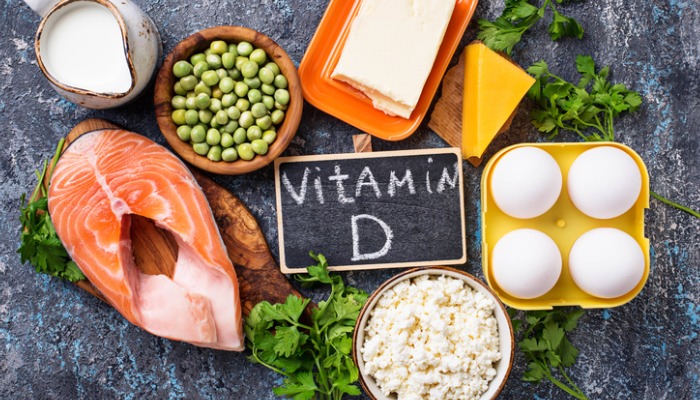Hair loss can happen at any time, but it’s most prevalent in adults, especially older adults. By the time you’re 50, you have a 50/50 chance of experiencing hair loss. This goes for both men and women.1
Hair loss can be caused by many things, including genetics and nutrition. While you can’t do anything about your DNA, you can do something about your nutritional status. In most cases, you can alter your diet if hair loss is a direct cause of a nutrient deficiency.
This article will discuss the possible causes of hair loss, whether diet can help, and the best foods for hair growth.
What causes hair loss?
Before you can remedy hair loss, you must get down to the root cause (no pun intended).
If your hair loss is a result of stress, for example, you’ll need to find ways to de-stress before your hair will re-grow.2 This type of hair loss may be due to chronic stress or a sudden, stressful event.3 Regardless of why you’re stressed, you may continue to experience hair loss if you don’t reduce stress.
But stress isn’t the only potential cause of hair loss. The list of potential causes is actually pretty long.
Possible causes of hair loss include:
- Genetics
- Nutrient deficiency
- Hair growth disorders
- Poor diet
- Hormone imbalance
- Drug and alcohol use
- Stress
- Depression
- Childbirth
- Chemotherapy4
Remember that hair loss can also happen with age, making it an inevitable part of life for some.
Since this article is about foods for hair growth, though, it’s important to delve into nutrient deficiencies further.
A nutrient deficiency occurs when a person is severely lacking a particular nutrient, usually a micronutrient (vitamins and minerals). You may have one deficiency or many nutrient deficiencies at the same time depending on the cause.5
Micronutrients are vital to bodily processes, including growing hair and maintaining hair health. So, if you have a nutrient deficiency (especially in a nutrient involved in the hair-growing process), you may experience hair loss.
Like hair loss, nutrient deficiencies have many possible causes. These include:
- Inadequate food intake
- Anorexia nervosa
- Prolonged fasting
- Dysphagia (trouble swallowing)
- Chronic vomiting or diarrhea
- Impaired digestion
- Malabsorption of nutrients
- Certain chronic issues5
Fortunately, in most cases, nutrient deficiencies can be reversed simply by changing your diet.
Can diet really help with hair loss?
As with most aspects of health, nothing beats a well-balanced diet.
Consistently consuming all the nutrients your body needs for proper function will help you maintain health. And this goes for the health of your hair, too.
Oftentimes, hair health is closely linked to nutritional status. For your hair follicles to do their job, for example, they need plenty of protein, calories, and micronutrients.6 This means that macronutrients (carbohydrates, fat, and protein) are another important part of hair health.
Protein is essential to hair health because the hair shaft is made up almost entirely of a type of protein called keratin. And carbohydrates seem to be the best source of energy for the cells that rapidly divide to grow hair.6
Some research suggests that certain types of diets can help with hair loss. One such diet is the Mediterranean diet.
According to researchers, the Mediterranean diet, which mainly consists of fruits, vegetables, legumes, nuts, grains, fish, and unsaturated fats, may decrease hair loss, and increase hair growth. This could be due to the high antioxidant profile of the Mediterranean diet, as well as the overall well-balanced nature of the diet.4
But adopting an entirely new diet may not be necessary when it comes to fixing hair loss caused by nutrient deficiencies. Adding certain foods and nutrients may be all you need.
Top foods for hair growth
Hair loss caused by nutrient deficiencies may be improved with the right foods.
Before getting into the best foods for hair growth, it’s worth mentioning that foods and nutrients won’t always be the answer to your hair loss woes. Hair loss that is a direct result of a nutrient deficiency can (in most cases) be reversed by replacing the nutrients you need. But diet changes probably won’t be the answer for hair loss caused by stress or genetics.
Also, if a nutrition deficiency isn’t present, then using supplements marketed for hair growth (like selenium, vitamin A, and vitamin E) may be harmful. Over-supplementing with these nutrients may cause further hair loss.1

It’s important that you see your healthcare provider about hair loss before getting started with any home remedies. Knowing the exact cause of your hair loss is an essential first step in the hair re-growth process.
Unfortunately, the scientific evidence on nutrient deficiencies and hair loss is not exactly clear. The results have been mixed in the many studies completed on the subject.
Nutrient deficiencies that have been linked to hair loss most often include:
- Iron
- Zinc
- Niacin
- Essential fatty acids
- Selenium
- Vitamin D
- Biotin
- Amino acids and proteins1
It’s best to use foods instead of supplements to get these and other nutrients your body needs for hair growth, as supplements are more likely to lead to excess nutrient intake than foods.
Once you know that your hair loss is a result of a nutrient deficiency you can start adding the right foods to your diet to help your hair re-grow.
Below is a look at some of the best foods for hair growth based on the most common nutrient deficiencies that cause hair loss.
1 – Iron
Iron can be found in both plant and animal foods. However, iron tends to be absorbed better when it comes from animals rather than plants.
Animal foods that are high in iron include:
- Beef
- Oysters
- Chicken
- Turkey
Plant foods that are high in iron include:
- Beans
- Lentils
- Tofu
- Potatoes
- Cashews
- Dark leafy greens
- Fortified cereals
- Whole grains
- Enriched breads
It’s recommended that you pair your iron-rich foods with vitamin C-rich foods, like bell peppers, lemons, or berries. Vitamin C facilitates the absorption and utilization of iron in the body.7
2 – Zinc

If your healthcare provider says you need more zinc, there are plenty of food options.
Foods that are high in zinc mostly come from animals, but some plant sources are available.
Zinc-rich foods include:
- Seafood
- Beef
- Fortified cereals
- Pumpkin seeds
- Pork
- Turkey
- Dairy products
- Lentils
- Peanuts
- Brown rice
- Eggs8
3 – Niacin
A niacin deficiency is rare, but not impossible. If a niacin deficiency is severe, this may lead to pellagra, which is more likely to cause hair loss.1
One of the reasons why a niacin deficiency is uncommon is because the nutrient is found in a wide variety of foods, including:
- Beef
- Chicken
- Turkey
- Seafood
- Rice
- Nuts and seeds
- Fortified cereals
- Potatoes
- Lentils
- Soy
- Tomatoes9
4 – Essential fatty acids

Unlike non-essential fatty acids, essential fatty acids cannot be synthesized by your body, which means you have to consume them through food. If you don’t get enough essential fatty acid, you may experience hair loss. Hair loss is mostly associated with two essential fatty acids, linoleic acid, and alpha-linolenic acid.1
Food sources of linoleic acid include:
- Vegetable oils
- Nuts
- Seeds
- Meat
- Eggs10
Food sources of alpha-linolenic acid (ALA) include:
- Flaxseeds and flaxseed oil
- Chia seeds
- Walnuts
- Canola oil
- Soybeans
- Edamame
- Beans11
5 – Selenium
Selenium is a trace element that’s present in many different types of food. If you have a selenium deficiency that’s contributing to hair loss, there are plenty of food options that may be helpful. These include:
- Brazil nuts
- Seafood
- Ham
- Enriched pasta
- Beef
- Turkey
- Chicken
- Dairy products
- Brown rice
- Eggs
- Lentils
- Cashews
Be sure to work with your healthcare provider to correct a selenium deficiency. Too much selenium can actually make hair loss worse.12
6 – Vitamin D

Vitamin D deficiency is more common than some of the other micronutrients on this list. And sometimes a deficiency in vitamin D can lead to hair loss.
Exposure to sunlight can help raise your vitamin D levels, but it can also be helpful to eat some foods that are rich in vitamin D if you are deficient. Food sources of vitamin D include:
- Seafood
- Mushrooms
- Dairy products
- Soy products
- Eggs
- Liver13
7 – Biotin
Many supplements marketed for hair growth contain biotin, a water-soluble vitamin that’s important to many processes in the body. However, you can get biotin through several food sources, including:
- Beef liver
- Eggs
- Salmon
- Pork
- Sunflower seeds
- Sweet potatoes
- Almonds
- Tuna
- Spinach
- Broccoli
- Cheddar cheese
- Milk14
8 – Amino acids and proteins
Hair loss may occur if you don’t get enough protein in your diet. As a macronutrient, protein is vital to your overall health, which includes the health of your hair. Proteins are made up of amino acids.
If you’ve been told that your hair loss is due to a protein deficiency, you can find the macronutrient in foods like:
- Seafood
- Meat
- Poultry
- Eggs
- Dairy products
- Beans
- Peas
- Lentils
- Nuts
- Seeds
- Soy products15
Using hair-loss supplements
While getting the nutrients above from your food is the best way to support healthy hair, there may be instances where you won’t be able to get all you need from your diet alone. This is where supplements can be helpful. However, you should be careful not to overdo it and use supplements only when you aren’t able to consume these nutrients from food sources.
In addition to supplements, certain herbs and essential oils may help to promote hair growth as well. Essential oils can be applied topically to better target the scalp.
The bottom line
Hair loss can be caused by many things, from age to genetics to diet. In most cases, though, you can eliminate hair loss and support hair growth once you know why it’s happening.
When hair loss is a result of a nutrient deficiency, the best thing you can do is alter your diet to get more of the nutrient(s) your body needs through food. Just be sure to work with your healthcare provider so you know exactly which nutrient your body needs to be replenished.
 About Brittany Lubeck
About Brittany Lubeck
Brittany Lubeck is a registered dietitian and nutrition writer. She has a Bachelor of Science in Dietetics, a Master of Science in Clinical Nutrition, and began her career as a clinical dietitian. Brittany has always enjoyed research and loves that she can help people learn more about nutrition through her writing.
Sources:
1. Guo, E.L., & R. Katta. “Diet and hair loss: effects of nutrient deficiency and supplement use.” Dermatology Practical & Conceptual 1, no. 7 (2017): 1-10.
2. Hair Loss: Who Gets and Causes. American Academy of Dermatology Association. AAD.org.
3. Rajput, R.J. “Influence of Nutrition, Food Supplements and Lifestyle in Hair Disorders.” Indian Dermatology Online Journal 6, no. 13 (2022): 721-724.
4. Gokce, N., N. Basgoz, et al. “An overview of the genetic aspects of hair loss and its connection with nutrition.” Journal of Preventive Medicine and Hygiene 2S3, no. 63 (2022): E228-E238.
5. Kiani, A.K., K.J. Dhuli, et al. “Main nutritional deficiencies.” Journal of Preventive Medicine and Hygiene 2S3, no. 63 (2022): E93-E101.
7. Kaufman, Caroline. “Foods to Fight Iron Deficiency.” Academy of Nutrition and Dietetics. Eatright.org.
8. “Zinc – Fact Sheet for Health Professionals.” National Institutes of Health – Office of Dietary Supplements. Ods.od.nih.gov.
9. “Niacin – Fact Sheet for Health Professionals.” National Institutes of Health – Office of Dietary Supplements. Ods.od.nih.gov.
10. Whelan, J. “Linoleic Acid.” Advances in Nutrition 3, no. 4 (2013): 311-312.
11. “Omega-3 Fatty Acids – Fact Sheet for Health Professionals.” National Institutes of Health – Office of Dietary Supplements. Ods.od.nih.gov.
12. “Selenium – Fact Sheet for Health Professionals.” National Institutes of Health – Office of Dietary Supplements. Ods.od.nih.gov.
13. “Vitamin D – Fact Sheet for Health Professionals.” National Institutes of Health – Office of Dietary Supplements. Ods.od.nih.gov.
14. “Biotin – Fact Sheet for Health Professionals.” National Institutes of Health – Office of Dietary Supplements. Ods.od.nih.gov.
15. “Protein Foods.” U.S. Department of Agriculture. Myplate.gov.